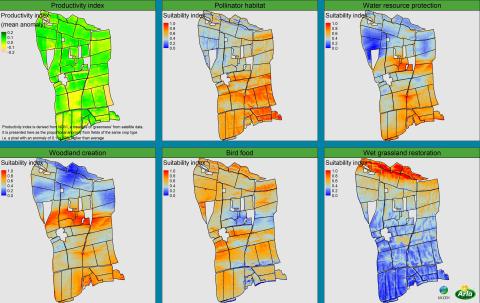The UK Centre for Ecology & Hydrology (UKCEH) is enabling dairy farmers make science-based decisions on which agri-environment options to introduce on their land.
Through a collaboration with Arla Foods, the UK’s leading dairy co-operative, farmers are trialling a customised version of UKCEH’s recently launched Environmental Planner (E-Planner) tool.
The free web-based tool is able to analyse satellite imagery and environmental datasets, assessing the suitability of unproductive or hard-to-farm areas of land for agri-environment options that are expected to attract a farming subsidy under Defra’s new Environmental Land Management (ELM) scheme, which is replacing the Common Agriculture Policy in England.
These four options are: planting flower-rich pollinator habitats; creating woodland; protecting water resources from pollution; and sowing winter bird food. The customised version for the Arla farms (pictured below) additionally assesses the suitability of land for wet grassland restoration, as well as providing information on grassland productivity.

The E-Planner tool calculates environmental factors that affect the suitability of the land for the different options, such as proximity to watercourses, south facing slopes or shading. This means farmers can gauge the likelihood of their success across their land and select the most suitable areas to enhance.
John Redhead, Senior Spatial Ecologist at UKCEH, who led the development of E-Planner, says: “This is a big step forward in how we can advise farmers about environmental decisions.
“Historically, it’s always been a challenge to bring together environmental information from digital data and farmer-specific local knowledge. The great thing about the E-Planner tool is its ability to present complex and detailed environmental information in a way that’s easy for farmers to access and explore, enabling them to make the best possible decisions.”
David Christensen, who manages a 1,300-acre dairy farm in Oxfordshire, is one of the Arla farmers who have been testing the technology. He explains: “The E-Planner tool is really helping to modernise the way we make management decisions for land that might have been previously considered unproductive in terms of sustainability and resilience.
“At the click of a button, we’re able to look at how the land behaves over time and can therefore make more educated decisions on how best to use all areas of the farm at key times of the year. It’s going to make an enormous difference to many farmers and the world around us.”
At the click of a button, we’re able to look at how the land behaves over time and make more educated decisions on how best to use all areas of the farm - Farmer David Christensen
Graham Wilkinson, Agricultural Director at Arla Foods, adds: “With environmental measures on farm compulsory for all of Arla’s dairy farmers, we hope that in working with the scientists at UKCEH we can ensure that they have access to the tools and resources that enable the best decisions.”
On completion of the trial, the co-operative will be looking to make the revised tool available to all the farms involved in its Arla 360 programme, which encourages best practice in environmental protection, animal welfare and business resilience. In the longer term, Arla hopes to make the customised tool available to all its 2,500 dairy farmers across the UK.
Further information
The E-Planner tool uses detailed environmental data at a resolution of just five metres on all two million-plus fields across Great Britain, and is available to be used for free at https://assist-e-planner.ceh.ac.uk/
It has been created as part of ASSIST, a partnership between UKCEH, Rothamsted Research and the British Geological Survey. This six-year, £12m National Capability programme is funded by the Natural Environment Research Council (NERC) and the Biotechnology & Biological Sciences Research Council (BBSRC).
The development of the tool comes ahead of the introduction of Defra’s Environmental Land Management (ELM) scheme. Under a principle of 'public money for public goods’, farmers will be expected to deliver an increasing range of environmental benefits as well as producing food under the new subsidy schemes that will replace the Common Agriculture Policy in England following the UK’s departure from the EU. Next year, ahead of ELM’s rollout in 2024, Defra will be starting pilot projects, some of which UKCEH will be involved in.
